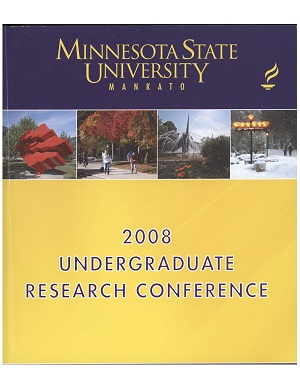The Effect of Activated Charcoal on Soil Microbial Communities in Symbiotic Relationships with Invasive Plant Species
Location
CSU Ballroom
Start Date
21-4-2008 1:00 PM
End Date
21-4-2008 3:00 PM
Student's Major
Biological Sciences
Student's College
Science, Engineering and Technology
Mentor's Name
Bradley Cook
Mentor's Department
Biological Sciences
Mentor's College
Science, Engineering and Technology
Second Mentor's Name
Timothy Secott
Second Mentor's Department
Biological Sciences
Second Mentor's College
Science, Engineering and Technology
Description
Some invasive plants release biochemicals into the soil, which can alter the surrounding microbial communities, and in tum affect the growth of native plants. The addition of activated charcoal could adsorb these secreted allelochemicals; however the effect of this addition on soil microbial communities is unknown. In order to study the effect of activated charcoal on soil microbial communities, soils associated with either a invasive plant species (reed canary grass) or a native sedge were chosen. Each soil was left fallow or trained by the growth of the corresponding plant. Half of each of the four soil types was mixed with activated charcoal. The soils were watered through 30 days and one gram was harvested at 0, 15 and 30 days. At each time interval the soil was homogenized with saline phosphate buffer and inoculated into BIOLOG plates with wells consisting of 95 different carbon substrates. Each plate was read at 590nm using a microplate spectrophotometer. Microbial carbon source utilization was determined using PC-Ord. At time 0, microbial carbon source utilization by communities in charcoal amended and unamended soils was very similar. However after 15 days, carbon source utilization patterns were different for communities in charcoal amended and unamended soils. This trend continued through 30 days. The initial assumption that activated charcoal does not effect the microbial communities proved to be incorrect as a clear separation in microbial carbon source utilization was observed between the activated charcoal treated and untreated soils.
The Effect of Activated Charcoal on Soil Microbial Communities in Symbiotic Relationships with Invasive Plant Species
CSU Ballroom
Some invasive plants release biochemicals into the soil, which can alter the surrounding microbial communities, and in tum affect the growth of native plants. The addition of activated charcoal could adsorb these secreted allelochemicals; however the effect of this addition on soil microbial communities is unknown. In order to study the effect of activated charcoal on soil microbial communities, soils associated with either a invasive plant species (reed canary grass) or a native sedge were chosen. Each soil was left fallow or trained by the growth of the corresponding plant. Half of each of the four soil types was mixed with activated charcoal. The soils were watered through 30 days and one gram was harvested at 0, 15 and 30 days. At each time interval the soil was homogenized with saline phosphate buffer and inoculated into BIOLOG plates with wells consisting of 95 different carbon substrates. Each plate was read at 590nm using a microplate spectrophotometer. Microbial carbon source utilization was determined using PC-Ord. At time 0, microbial carbon source utilization by communities in charcoal amended and unamended soils was very similar. However after 15 days, carbon source utilization patterns were different for communities in charcoal amended and unamended soils. This trend continued through 30 days. The initial assumption that activated charcoal does not effect the microbial communities proved to be incorrect as a clear separation in microbial carbon source utilization was observed between the activated charcoal treated and untreated soils.
Recommended Citation
Welikadage, Nisajith N. P.. "The Effect of Activated Charcoal on Soil Microbial Communities in Symbiotic Relationships with Invasive Plant Species." Undergraduate Research Symposium, Mankato, MN, April 21, 2008.
https://cornerstone.lib.mnsu.edu/urs/2008/poster-session-B/21




